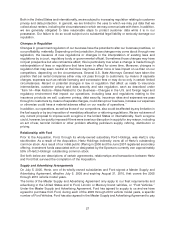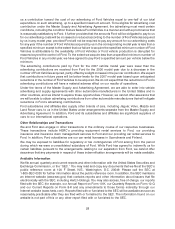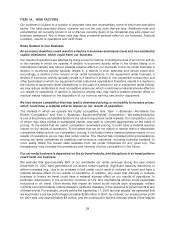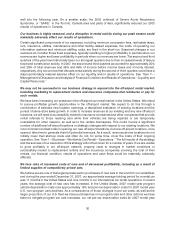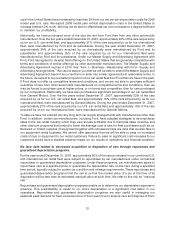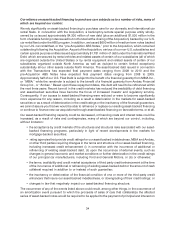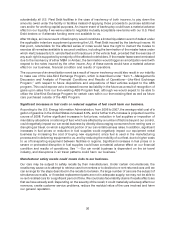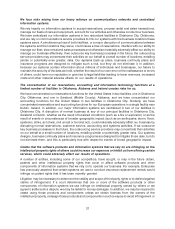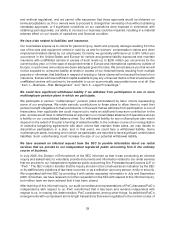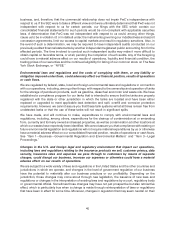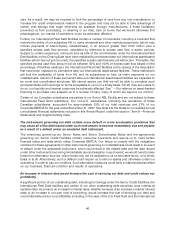Hertz 2007 Annual Report Download - page 56
Download and view the complete annual report
Please find page 56 of the 2007 Hertz annual report below. You can navigate through the pages in the report by either clicking on the pages listed below, or by using the keyword search tool below to find specific information within the annual report.substantially all U.S. Fleet Debt facilities in the case of insolvency of both insurers, to pay down the
amounts owed under the facility or facilities instead of applying those proceeds to purchase additional
cars and/or for working capital purposes. An insurer event of bankruptcy could have a material adverse
effect on our liquidity if we were unable to negotiate mutually acceptable new terms with our U.S. Fleet
Debt lenders or if alternate funding were not available to us.
After 30 days, an insurer event of bankruptcy would constitute a limited liquidation event of default under
the applicable indenture supplement governing the U.S. Fleet Debt insured by the bankrupt insurer. At
that point, noteholders for the affected series of notes would have the right to instruct the trustee to
exercise all remedies available to secured creditors, including the termination of the master lease under
which Hertz leases its U.S. vehicle fleet and foreclosure of the vehicle fleet, provided that the exercise of
any such right is supported by a majority of the affected noteholders. If the master lease were terminated
due to the insolvency of either MBIA or Ambac, the termination would trigger an amortization event with
respect to the notes insured by the other insurer. Any of these events would have a material adverse
effect on our business, financial condition and results of operations.
The occurrence of an amortization event as a result of insurer insolvency would also result in our inability
to make use of the Like-Kind Exchange Program, which is described under ‘‘Item 7—Management’s
Discussion and Analysis of Financial Conditions and Results of Operations—Like-Kind Exchange
Program,’’ with respect to future dispositions and acquisitions of fleet vehicles subject to the ABS
program. This could expose us to increased income tax liability in the future as a result of recognition of
gains upon sales from our then-existing ABS Program fleet, although we would expect to be able to
utilize the Like-Kind Exchange Program for certain cars within our then-existing fleet as well as future
cars purchased outside of the ABS Program.
Significant increases in fuel costs or reduced supplies of fuel could harm our business.
According to the U.S. Energy Information Administration, from 2006 to 2007, the average retail cost of a
gallon of gasoline in the United States increased 8.9%, and a further 9.4% increase is projected over the
course of 2008. Further significant increases in fuel prices, reduction in fuel supplies or imposition of
mandatory allocations or rationing of fuel, which are affected by a number of factors beyond our control,
could negatively impact our car rental business by directly discouraging consumers from renting cars or
disrupting air travel, on which a significant portion of our car rental business relies. In addition, significant
increases in fuel prices or reduction in fuel supplies could negatively impact our equipment rental
business by increasing the cost of buying new equipment, since fuel is used in the manufacturing
process and in delivering equipment to us, and by reducing the mobility of our fleet, due to higher costs
to us of transporting equipment between facilities or regions. Significant increases in fuel prices or a
severe or protracted disruption in fuel supplies could have a material adverse effect on our financial
condition and results of operations. See ‘‘—Our car rental business is dependent on the air travel
industry, and disruptions in air travel patterns could harm our business.’’
Manufacturer safety recalls could create risks to our business.
Our cars may be subject to safety recalls by their manufacturers. Under certain circumstances, the
recalls may cause us to attempt to retrieve cars from renters or to decline to re-rent returned cars until we
can arrange for the steps described in the recalls to be taken. If a large number of cars are the subject of
simultaneous recalls, or if needed replacement parts are not in adequate supply, we may not be able to
re-rent recalled cars for a significant period of time. We could also face liability claims if recalls affect cars
that we have already sold. Depending on the severity of the recall, it could materially adversely affect our
revenues, create customer service problems, reduce the residual value of the cars involved and harm
our general reputation.
36



